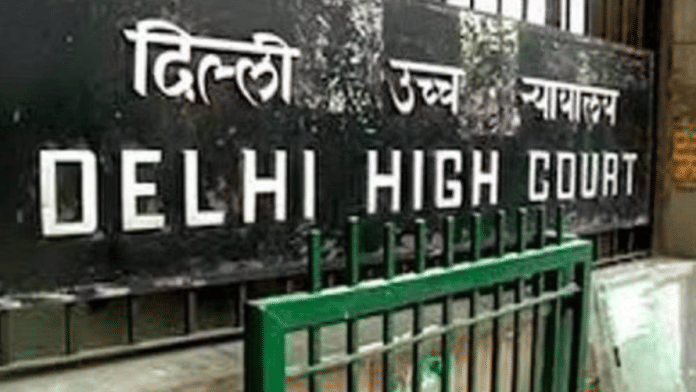New Delhi: At a time when courts are carving an exception on humanitarian grounds for the “near majority, consensual relationships” to meet the ends of justice, the Delhi High Court has adopted a stricter interpretation of the Prevention of Children from Sexual Offences (POCSO) Act.
In a recent order, the Delhi High Court refused to quash criminal charges against the petitioner, Prince Kumar Sharma, and his parents, despite his wife’s submission that their underage marriage was consensual and her urgent request to end proceedings.
The case originated from a domestic violence helpline call received 19 July 2023, at the Bhalswa Dairy police station. Police found that Sharma, 19, and the 16-year-old girl were living as husband and wife, claiming to have married on 1 March that year with approval of their families.
“Since Parliament has fixed 18 as the age below which the law refuses to recognise sexual consent, the court, in the guise of equity, cannot write a judge-made exception of ‘near majority, consensual relationships’. If done so, the court would be crossing the line from interpretation into legislation,” Justice Sanjeev Narula said in his judgement dated 14 November.
In her statement under Section 164 (ecording of confessions & statements before a magistrate) of the erstwhile Code of Criminal Procedure (CrPC), the girl did not allege rape, coercion, or abuse. She added that she did not want legal action against her husband or his family.
A medical examination revealed that the girl was about two-and-a-half months pregnant, resulting in an FIR registered under Section 376 (rape) of the erstwhile Indian Penal Code (IPC), Section 6 of the POCSO Act, and Sections 9 and 10 of the Prohibition of Child Marriage Act (PCMA), which relate to punishment for rape, aggravated penetrative sexual assault on minors, and for adults marrying minors or those abetting such marriages, respectively.
Sharma and his relatives approached the Delhi High Court under Section 528 of the Bharatiya Nagarik Suraksha Sanhita (BNSS), seeking to quash the FIR. Section 528 of the BNSS grants High Courts inherent powers to quash FIRs or proceedings to prevent abuse of process or secure the ends of justice.
The court, Justice Narula said, is not indifferent to the girl’s wish to protect her family.
“In fact, this court is moved by the circumstances, but it is bound by the statute. This is, therefore, one of those hard cases where the pull of equity is strong, but the command of the statute is stronger. This court, for securing the ends of justice, cannot carve out an exception to the statute merely because the victim describes the relationship as consensual.”
Also Read: From child protection to ‘moral policing’ tool: How POCSO Act is leaving courts conflicted
‘Profound consequences’
Swati Jindal Garg, advocate-on-record, Supreme Court, hailed the order saying that refusing to quash an FIR in cases born from “once-consensual relationships sets off profound legal, social, and psychological consequences, consuming immense judicial resources and deepening the backlog of pending cases.”
“A criminal case acts as a poison in any relationship, and the stress, stigma, and public scrutiny of a trial can lead to severe anxiety, depression, and lasting trauma. This inflexible approach represents a systemic failure to balance the letter of the law with the spirit of justice, transforming a shield into a sword,” the child rights expert added.
In several cases, the courts have adopted a more humanitarian approach when teen couples elope and later build stable families like in the the G Raghu Varma (2024) case.
While quashing a case lodged against a 21-year-old for his relationship with a minor, the Karnataka High Court had said that the POCSO Act is designed to safeguard minors from sexual abuse, not to penalize consensual relationships between adolescents.
Similarly, in 2024, the Madras High Court quashed kidnapping and POCSO charges against a man who eloped with a 17-year-old girl, married her with consent, and had a child. Referring to it as a ‘Romeo-Juliet’ case, the judge opined that since the couple was living together peacefully and had built a stable family, continuing the case would not help anyone. Their future, the court said, should matter more than strictly applying the law.
Another case (Sujit Kumar) from the same year saw the Delhi High Court quash POCSO and IPC charges against a 19-year-old man in a consensual relationship with a 17-year-old girl that led to marriage and a child. Citing the court’s inherent powers on humanitarian grounds, the HC ruled that continuing the case would destroy young lives and harm the child’s welfare, drawing on precedents about impulsive teen romances.
Swagata Raha, head, research and co-head restorative practices, Enfold India, said that what stands out in the latest judgment is the repeated acknowledgement of the hardship faced by the adolescent girl from the law meant to protect her. “The consequence is the inability of the POCSO Act to distinguish between exploitative situations and consensual relationships,” she told ThePrint.
“While child marriage is a serious concern, evidence shows that structural interventions, such as poverty alleviation schemes, access to free and compulsory education till 18 years, conditional cash transfers, and gender transformative approaches, are more effective than punitive laws in reducing child marriage.”
“Boys and young men are labelled ‘rapists’ and sexual offenders and have to go through a trial with a possibility of imposition of high minimum mandatory sentences, from 10 to 20 years. In cases where the accused is a child in conflict with the law and above 16 years, they may be tried as an adult and face the same punishment an adult would,” Raha said.
Vaibhav Pant is a TPSJ alum, currently interning with ThePrint.
(Edited by Tony Rai)
Also Read: More and more POCSO cases are being settled by victim-accused marriages






